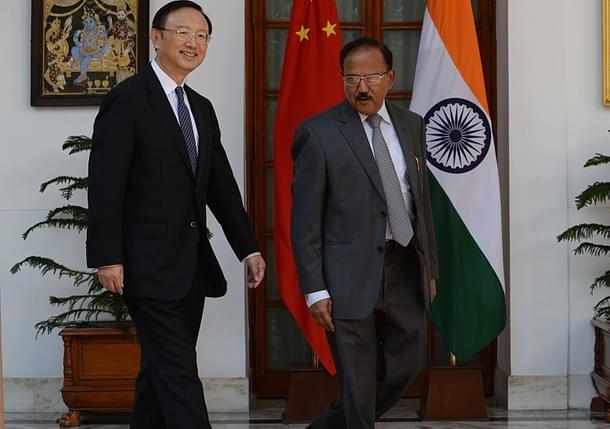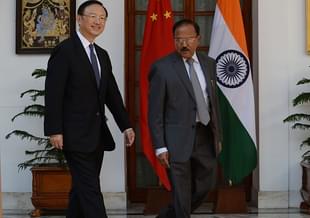World
Why Should China Support India’s Bid For NSG
Swaptik Chowdhury
Jun 22, 2016, 05:57 PM | Updated 05:57 PM IST
Save & read from anywhere!
Bookmark stories for easy access on any device or the Swarajya app.


The geo-political ascendancy of India achieved a new milestone this month when it was granted the membership of missile technology control regime (MTCR). This was considered as a major achievement of Prime Minister Narendra Modi’s foreign policy.
The membership allows India to buy or sell advanced missile technology and military know-how from a third-party, in accordance with the guidelines of membership.
However, many analysts viewed the MTCR membership of India as a stepping stone to get into the elite Nuclear Suppliers Group (NSG), which was ironically founded after the first nuclear test conducted by India in 1974. The NSG is poised to meet in Seoul for the 23-24 June plenary and India’s membership will be an important issue to be discussed.
The United States (US) is strongly supporting India’s NSG membership and has been quite vociferous about it, with US Secretary of State John Kerry writing letter to support India’s candidature. Also, in his recently concluded five-nation visit, Prime Minister Modi was able to build a consensus in India’s favour and garner support from Mexico, Japan and Switzerland.
The countries which are still opposing India’s membership are, New Zealand, Ireland, Turkey, South Africa, Austria and China. China, however, has softened its stand and said: “the door is open” for the admission of non-NPT members “but the members of the NSG should stay focused on whether the criteria should be changed.”
The chief contention among the opposing countries is India’s refusal to sign the nuclear Non-Proliferation Treaty (NPT). India maintains that military use of nuclear technology is a matter of its national security and thus denies any negotiation on the topic. Many argue that allowing India would set a precedent for other non-NPT countries such as Pakistan, and weaken the stringent NSG eligibility criteria.
However, many diplomats attribute the opposition of China to its more congenial relationship with Pakistan.
The US is trying to negate the growing influence of China in South-East Asia and aims to develop India as an ally in the developing world.
Several new India-US agreements such as Logistics Exchange Agreement, which provides provision of sharing military facilities between the two nations are in negotiation and may harm the geo-strategic interest of China as it threatens Beijing hegemony in South-East Asia.
This increasing bilateral ties between India and the US is a cause for concern for China and thus it was refusing to recognise India in NSG and lobbying for Pakistan.
The trade benefits associated with NSG is also an important factor in China’s resistance to India’s membership as it is sceptic of granting New Delhi the same benefits as it enjoys in international nuclear market.
India has sizeable deposit of uranium and thorium, which can be traded in international market and thus have huge trade potential.
New Delhi argues that it was applying for membership based ‘on merit’ and not ‘on guidelines’ and asserts that it is not required to be a NPT-signed country to be a member of NSG.
At a Press Conference, External Affairs Ministry spokesman Vikas Swarup argued that France was a member of NSG while it was not a NPT nation and thus, China’s objection on India being a non-NPT nation is ambiguous.
But it is evident that the moves are in play and finer diplomacy is needed to advance respective national interest (China, India and the US), before any satisfactory conclusion could be reached.
However, many officials and diplomats argue that China should support India’s NSG application. India already has trade exemption which was granted in 2008 under George Bush government and allows India to engage in civil nuclear commerce. It also led to exchange of novel nuclear technologies between US and India.
China supported India in this endeavour albeit on the insistence of the then US president but it is strategically important that China does the same in Seoul too. China is widely viewed as a proliferator of nuclear technology as it has helped states such as North Korea and Pakistan in the past to gain access to nuclear technology for military purpose.
Supporting India would set a positive precedent for China for a membership of MTCR to which India was recently granted membership and China is not a member.
India and China have similar interest and voting pattern on pertinent economic policies such as climate funding and World Trade Organisation, and this is in accordance with Prime Minister Modi’s foreign policy, which is more focused on trade opportunities rather than geo-political associations.
This can present a unique opportunity for China to increase its trade commitments with India. Also, the US Congress recently rejected an amendment to grant India a special status as global strategic and defence partner, which exhibit a lack of dimension in India-US strategic cooperation and gives China a ‘wiggle-room’ to extend cooperation with India especially in trade and commerce.
Given the geographical location of India and China and a shared past, it is evident that they will be rivals but the recent allocation of approximately $300 million to Pakistan by the US to ‘fight terror’ implies that Pakistan is still a close ally of the US and it would be mutually beneficial for India and China to extend cooperation.
The recent missile and nuclear development of North Korea also poses a threat to the national security of China and thus is in need of new allies.
China is aware of the threat North Korea poses and thus backed the increase in United Nation sanctions after Pyongyang‘s missile test.
The common threat is in the form of Islamic State of Iraq and Syria (ISIS) and associated terrorism, making it more important for India and China to have some level of cooperation as both the countries are a part of ‘grand’ caliphate of ISIS. Thus, the change in global politics and economics have led to the evolution of many new factors which China need to contemplate before it decided to throw a wrench in India’s effort to gain NSG membership.
Swaptik Chowdhury is an independent policy commentator at The Diplomat, Swarajya, The Quint, and DailyO. He tweets at @swaptiktweets.





